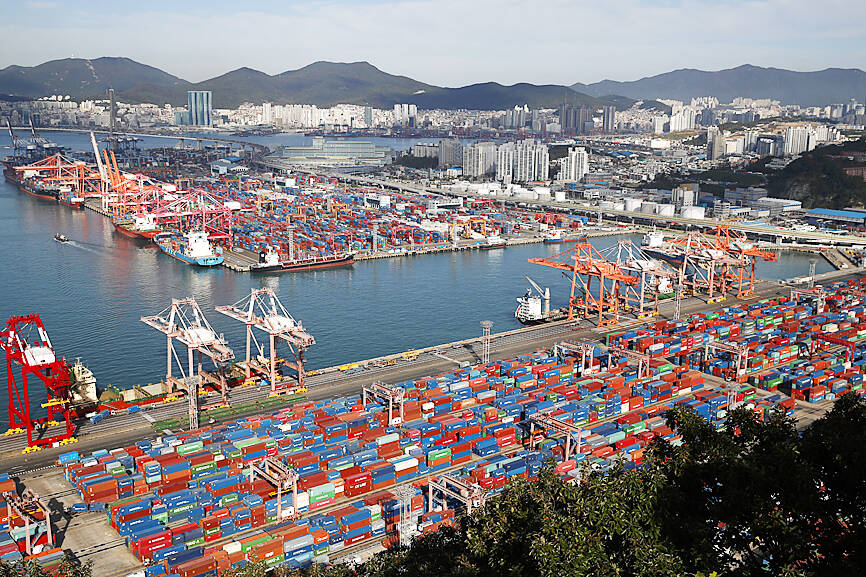South Korea plans on strengthening cooperation with India as Seoul attempts to align with a US-led push to diversify the global supply chain away from China.
“In the era of economic security, it is essential to strengthen supply chain and science and technology cooperation with India,” said South Korean Minister of Foreign Affairs Park Jin, who was on a two-day visit to India that began on Friday.
Park said India shares universal values such as democracy, possesses enormous growth potential and is a crucial partner for South Korea, the South Koran Ministry of Foreign Affairs said in a statement yesterday.

Photo: EPA-EFE
“Business entrepreneurs who are investing and operating in India must play a crucial role in realizing this,” Park told business leaders in Chennai.
In response, delegates highlighted the importance of fostering stronger human and cultural exchanges between the two countries to boost economic cooperation.
US President Joe Biden’s administration has been seeking help from allies, including South Korea, in reducing the global supply chain’s dependence on China, while also imposing sweeping curbs on the sale of advanced semiconductor equipment.
India has been one of the beneficiaries in the broader shift, as companies such as Apple Inc increase manufacturing capacity in the South Asian nation.
Separately, US Secretary of Commerce Gina Raimondo called on European governments to work with the US to fight climate change and counter Chinese clout, the latest sign that Washington hopes allies follow its lead in passing a landmark climate bill.
The US passage of the Inflation Reduction Act rankled European leaders, who complained that it was an unfair subsidy. The Biden administration has sought to soothe that angst, while signaling that Europe should match them rather than start a trade fight.
“We need to work together, and I think whether it’s the IRA or the chips initiative, there’s opportunities for European companies and opportunities for us to work together to meet the moment with climate change and our global competition with China,” Raimondo told Bloomberg Television on Friday. “So, initial hurt feelings, maybe. But there’s a lot of good work to do together.”
She said the US approach to China is to protect US technology and national security, while promoting exports of certain goods.
She also said the US is not looking to make all semiconductor chips on its own soil, but must rely less on Asia.
“Nobody thinks that we should be making everything that we need in America,” she said. “The fact that we buy 90-plus percent of our leading-edge chips from Taiwan is also unsustainable and, quite frankly, almost dangerous.”

The US dollar was trading at NT$29.7 at 10am today on the Taipei Foreign Exchange, as the New Taiwan dollar gained NT$1.364 from the previous close last week. The NT dollar continued to rise today, after surging 3.07 percent on Friday. After opening at NT$30.91, the NT dollar gained more than NT$1 in just 15 minutes, briefly passing the NT$30 mark. Before the US Department of the Treasury's semi-annual currency report came out, expectations that the NT dollar would keep rising were already building. The NT dollar on Friday closed at NT$31.064, up by NT$0.953 — a 3.07 percent single-day gain. Today,

‘SHORT TERM’: The local currency would likely remain strong in the near term, driven by anticipated US trade pressure, capital inflows and expectations of a US Fed rate cut The US dollar is expected to fall below NT$30 in the near term, as traders anticipate increased pressure from Washington for Taiwan to allow the New Taiwan dollar to appreciate, Cathay United Bank (國泰世華銀行) chief economist Lin Chi-chao (林啟超) said. Following a sharp drop in the greenback against the NT dollar on Friday, Lin told the Central News Agency that the local currency is likely to remain strong in the short term, driven in part by market psychology surrounding anticipated US policy pressure. On Friday, the US dollar fell NT$0.953, or 3.07 percent, closing at NT$31.064 — its lowest level since Jan.

The New Taiwan dollar and Taiwanese stocks surged on signs that trade tensions between the world’s top two economies might start easing and as US tech earnings boosted the outlook of the nation’s semiconductor exports. The NT dollar strengthened as much as 3.8 percent versus the US dollar to 30.815, the biggest intraday gain since January 2011, closing at NT$31.064. The benchmark TAIEX jumped 2.73 percent to outperform the region’s equity gauges. Outlook for global trade improved after China said it is assessing possible trade talks with the US, providing a boost for the nation’s currency and shares. As the NT dollar

The Financial Supervisory Commission (FSC) yesterday met with some of the nation’s largest insurance companies as a skyrocketing New Taiwan dollar piles pressure on their hundreds of billions of dollars in US bond investments. The commission has asked some life insurance firms, among the biggest Asian holders of US debt, to discuss how the rapidly strengthening NT dollar has impacted their operations, people familiar with the matter said. The meeting took place as the NT dollar jumped as much as 5 percent yesterday, its biggest intraday gain in more than three decades. The local currency surged as exporters rushed to